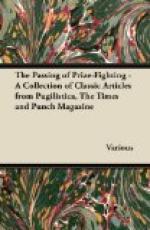The Ballybun express carries no goods whatever, except with the connivance of the guard and driver, who are both very decent Ballybun boys, and will bring anything down from Dublin for anyone. They promised to carry the statue themselves from the railway station up to McAroon’s house. If the express was less than three hours late, which it was sure to be if it was running smoothly, they could just beam-end the statue on its pedestal and the presiding elder could unveil it with a hammer.
The train was not too late, just punctually late, and the guard had time to hurry the statue along through the biggest crowd we have had for years in Ballybun.
The Minister said that he would not open the case with prayer, because it might give offence to friends of other Christian denominations; he would just knock the front off and let this matchless piece of statuary from the blue skies of Italy dazzle them with its beauty. It needed no words from him, but he would just like to remind any of his flock present that the collection next Sunday was for the heathen both at home and abroad.
The statue then flashed out on us and left us breathless.
It was the most scandalous thing ever seen in Ballybun; it was Venus rising from the sea without a stitch. There she stood with one hand raised toward the sky and the other pointing at the backs of all the pious people in Ballybun as they hurried indignantly home. Some of them blamed McAroon, while others said that Murphy knew all the time what a Tombola really was and that he ought to be ashamed of himself.
The Bishop ordered his people not to deal at McAroon’s until Murphy had removed the scandalous object. So many bitter things were said that McAroon, who is obstinate when roused, vowed that as long as the sun shone in heaven the lady should add lustre to his back-yard. The Minister however tried to move him to a more prayerful spirit.
McAroon said it wouldn’t be right to smash up for firewood a marble statue that had cost five hundred pounds if a penny. The clergyman said that if everybody stopped away from his store he would lose more than that in a year, and that in any case, if McAroon suffered, he would suffer in the holy cause of charity.
McAroon’s piety was touched, and he said that in the interests of peace and holy charity he would agree on a compromise. He had forsooth to keep his vow and let the lady stop, but she had two outstretched arms and there was always abundance of family washing on hand in the daytime at all events. The clergy of all denominations agreed that his decision was in keeping with the best traditions of a Family Grocer.
Murphy and McAroon made it up publicly. Murphy asked how anyone in Ballybun could possibly know the Italian bathing regulations. Italy was a godless country; but “anyway,” said he, “hear you me. I have suffered so much in mind from this that I have done with charity for ever.”




